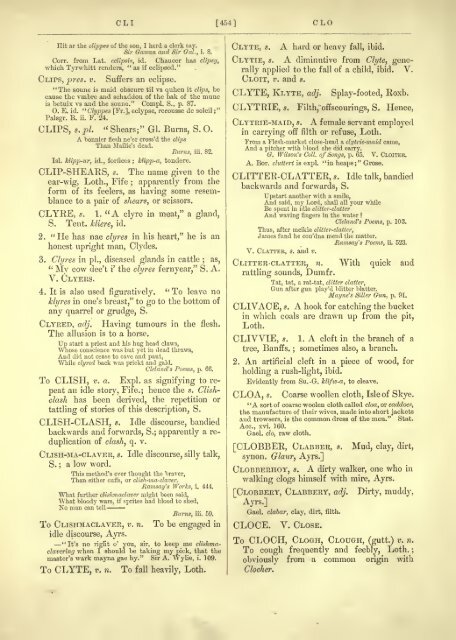An etymological dictionary of the Scottish language - Electric Scotland
An etymological dictionary of the Scottish language - Electric Scotland
An etymological dictionary of the Scottish language - Electric Scotland
You also want an ePaper? Increase the reach of your titles
YUMPU automatically turns print PDFs into web optimized ePapers that Google loves.
CLI [454] CLO<br />
Hit ar <strong>the</strong> dippes <strong>of</strong> <strong>the</strong> son, I herd a clerk say.<br />
Sir Gawan and Sir Gal., i. 8.<br />
Corr. from Lat. ecllpsis, id. Chaucer has clipsy,<br />
which Tynvhitt renders, " as if eclipsed."<br />
CLIPS, pres. v. Suffers an eclipse.<br />
"The soune is maid obscure til vs quhen it clips, be<br />
cause <strong>the</strong> vmbre and schaddou <strong>of</strong> <strong>the</strong> bak <strong>of</strong> <strong>the</strong> mune<br />
is betuix vs and <strong>the</strong> soune." Compl. S., p. 87.<br />
0. E. id. "Clyppes [Fr.], eclypse, recousse de soleil ;"<br />
Palsgr. B. ii. F. 24.<br />
CLIPS, . pi " Shears;" Gl. Burns,<br />
S. O.<br />
A bonnier flesh ne'er cross'd <strong>the</strong> clips<br />
Than Mailie's dead.<br />
Burns, iii. 82.<br />
Isl. klipp-ur, id., forfices ; k!ipp-a, tondere.<br />
CLIP-SHEARS, s. The name given to <strong>the</strong><br />
ear-wig, Loth., Fife ; apparently from <strong>the</strong><br />
form <strong>of</strong> its feelers, as having some resemblance<br />
to a pair<br />
<strong>of</strong> shears, or scissors.<br />
CLYEE, s. 1. "A clyre in meat," a gland,<br />
S. Teut. kliere, id.<br />
2. " He has nae clyres in his heart," he is an<br />
honest upright man, Clydes.<br />
3. Clyres in pi., diseased glands in cattle ; as,<br />
" My cow dee't i' <strong>the</strong> clyres fernyear," S. A.<br />
V. CLYERS.<br />
" To leave no<br />
4. It is also used figuratively.<br />
klyres in one's breast," to go to <strong>the</strong> bottom <strong>of</strong><br />
any quarrel or grudge, S.<br />
CLYRED, adj. Having tumours in<br />
The allusion is to a horse.<br />
<strong>the</strong> flesh.<br />
Up start a priest and his hug head claws,<br />
Whose conscience was but yet in dead thraws,<br />
<strong>An</strong>d did not cease to cave and paut,<br />
While clyred back was prickt anil gald.<br />
Cleland's Poems, p. 66.<br />
To CLISH, v. a. Expl. as signifying<br />
to repeat<br />
an idle story, Fife.; hence <strong>the</strong> s. Clishclash<br />
has been derived, <strong>the</strong><br />
repetition<br />
or<br />
tattling <strong>of</strong> stories <strong>of</strong> this description, S.<br />
CLISH-CLASH, s. Idle discourse, bandied<br />
backwards and forwards, S.; apparently a re-<br />
duplication <strong>of</strong> clash, q. v.<br />
CLISH-MA-CLAVER, s. Idle discourse, silly talk,<br />
S. a low word.<br />
;<br />
Tliis method's ever thought <strong>the</strong> braver,<br />
Than ei<strong>the</strong>r cuffs, or clis/i-ma-claver.<br />
Ramsay's Works,<br />
i. 444.<br />
What fur<strong>the</strong>r clishmaclaver might been said,<br />
What bloody wars, if sprites had blood to shed,<br />
No man can tell<br />
Burns, iii. 59.<br />
To CLISHMACLAVER, v. n. To be engaged in<br />
idle discourse, Ayrs.<br />
" It's no riglit o' you, sir, to keep me clishrnaclavering<br />
when I should be taking my pick, that <strong>the</strong><br />
master's wark mayna gae by." Sir A. Wylie, i. 109.<br />
To CLYTE, v. n. To fall heavily, Loth.<br />
CLYTE, s, A hard or heavy fall, ibid.<br />
CLYTIE, s. A diminutive from Clyte, generally<br />
applied to <strong>the</strong> fall <strong>of</strong> a child, ibid. V.<br />
CLOIT, v. and s.<br />
CLYTE, KLYTE, adj. Splay-footed, Roxb.<br />
CLYTRIE, s. Filth, <strong>of</strong>fscourings, S. Hence,<br />
CLYTRIE-MAID, s. A female servant employed<br />
in carrying <strong>of</strong>f filth or refuse, Loth.<br />
From a Flesh-market close-head a dytrie-maid came,<br />
<strong>An</strong>d a pitcher with blood she did carry.<br />
G. Wilson's Coll. <strong>of</strong> Songs, p. 65. V. CLOITER.<br />
A. Bor. chittert is expl. "in heaps;" Grose.<br />
GLITTER-CLATTER, s. Idle talk, bandied<br />
backwards and forwards, S.<br />
Upstart ano<strong>the</strong>r with a smile,<br />
<strong>An</strong>d said, my Lord, shall all your while<br />
Be spent in idle dittcr-clatter<br />
<strong>An</strong>d waving fingers in <strong>the</strong> water ?<br />
Cleland's Poems, p. 103.<br />
Thus, after meikle clitter-claUer,<br />
James fund he cou'dna mend <strong>the</strong> matter.<br />
Ramsay's Poems,<br />
V. CLATTER, a. and v.<br />
ii. 523.<br />
GLITTER-CLATTER, n. With quick and<br />
rattling sounds, Dumfr.<br />
Tat, tat, a rat-tat, clitter clatter,<br />
Gun after gun play'd Hitter blatter.<br />
Afayne's Siller Gun, p. 91.<br />
CL1VACE, s. A hook for catching <strong>the</strong> bucket<br />
in which coals are drawn up from <strong>the</strong> pit,<br />
Loth.<br />
CLIVVIE,<br />
s. 1. A cleft in <strong>the</strong> branch <strong>of</strong> a<br />
tree, Banffs. ; sometimes also, a branch.<br />
2. <strong>An</strong> artificial cleft in a piece <strong>of</strong> wood, for<br />
holding a rush-light, ibid.<br />
Evidently from Su.-G. klifw-a, to cleave.<br />
CLOA, s. Coarse woollen cloth, Isle <strong>of</strong> Skye.<br />
"A sort <strong>of</strong> coarse woolen cloth called cloa, or caddoex,<br />
<strong>the</strong> manufacture <strong>of</strong> <strong>the</strong>ir wives, made into short jackets<br />
and trowsers, is <strong>the</strong> common dress <strong>of</strong> <strong>the</strong> men." Stat.<br />
Ace., xvi. 160.<br />
Gael, do, raw cloth.<br />
[CLOBBER, CLABBER, s. Mud, clay, dirt,<br />
synon. Glaur, Ayrs.]<br />
CLOBBERHOY, s. A dirty walker, one who in<br />
walking clogs himself with mire, Ayrs.<br />
[CLOBBERY, "<br />
CLABBERY, adj.<br />
Ayrs.]<br />
Dirty, muddy,<br />
Gael, clabar, clay, dirt, filth.<br />
CLOCE. V. CLOSE.<br />
To CLOCH, CLOGH, CLOUGH, v.<br />
(gutt.)<br />
n.<br />
To cough frequently and feebly, Loth. ;<br />
obviously from a common Clocher.<br />
origin<br />
witli

















